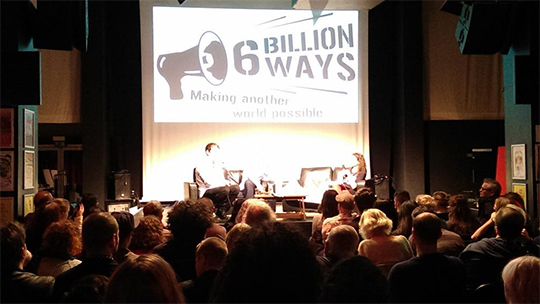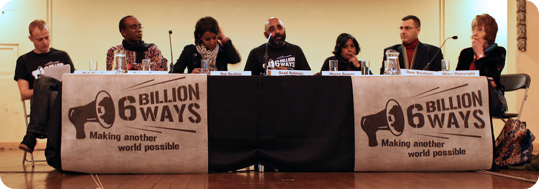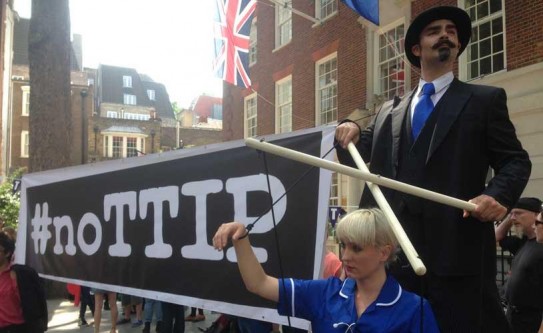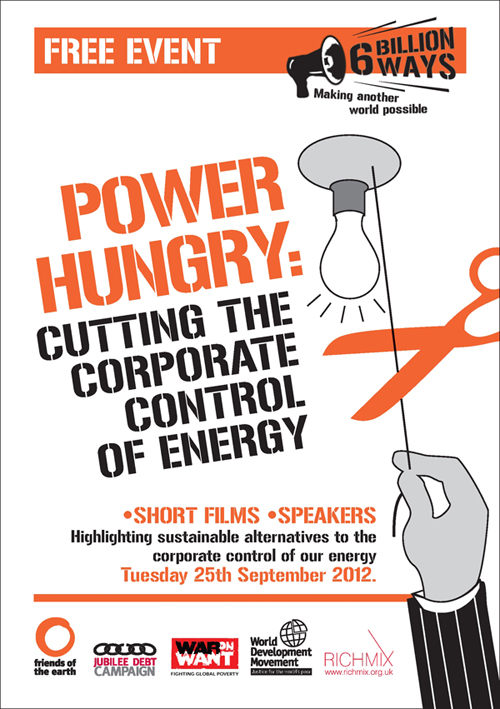
A big thanks to everyone who made it to our #noTTIP film night last night. There was a really great buzz and lots of energy for derailing this corporate power grab in its entirety.
All of the films shown are available on YouTube, and we’re including the links below (they’re listed in the order they were shown). Feel free to take inspiration from our selection to put on your own film night in your area.
What did you think?
Also, if you were there last night, let us know how it worked for you as a film night in the comments. Was the balance of the films right? Are there other TTIP films you’ve seen that could have been included? We’d love to know.
Finally, make sure you’re on the 6 Billion Ways mailing list (sign up in the box on the right) to find out about our next film night in the new year.
The films
1. Get ready for TTIP (1m 46s)
2. TTIP: A race to the bottom (1m 42s)
3. Why is TTIP more than a Trade Agreement (11m 18s)
4. No Fracking Way (5m 11s)
5. What is the Transatlantic Trade and Investment Partnership? (4m 08s)
6. Spizzwinks sing TTIP (1m 11s)
7. Politics for People (2m 48s)
8. Trans-Pacific Partnership (10m 56s)
9. WDM #NoTTIP: Join the Movement (1m 28s)
]]>6.30pm-9pm
Rich Mix, 35-47 Bethnal Green Road, London E1 6LA
***free event – no need to register***
It will cost at least one million jobs. It will lock in fossil fuel dependency for the coming decades. It will irreversibly extend the privatisation of key public services such as the NHS. It will make it harder to regulate the banks. And it will give US corporations the power to sue the UK and other states for loss of profits when these governments introduce public policies designed to protect their citizens.
It is the Transatlantic Trade and Investment Partnership (TTIP). If it goes through, it will be the greatest transfer of power to big business that we have seen for a generation.
But now for the good news: there’s every chance we can stop it.
Join us for an evening of films and speakers on the growing fight back against TTIP. Find out how you can join the resistance, what local actions you can be involved in, and most importantly, discuss how we can win!
- Join and share on Facebook >>
- Suggested tweet: TTIP: Capitalism on Steroids, 6 Billion Ways film night at Rich Mix, Tuesday 14 October https://t.co/cJAPR3LkZ0 #noTTIP
If the UK receiving a month’s rain in a day wasn’t enough – or the unbelievable speed the Arctic’s melting – a new report released this week shows that climate change is already here: it’s already costing the world $1.2 trillion a year (the combined GDP of Norway, Denmark and the United Arab Emirates), and is set to get far worse. As the recent 6 Billion Ways film night showed, it’s because vested corporate interests are keeping us hooked on dirty fossil fuels while they rake in billions. The film night also showed how the very same energy system is failing billions across the world who continue to live in energy poverty. If we’re to fix our broken energy system, tackling climate change and energy poverty, then we need fair, ambitious action from world governments. But the last big chance we had – this summer’s UN Sustainable Development Conference, aka Rio+20, didn’t deliver. Friends of the Earth’s analysis shows how bad the deal was for people and the planet, and a follow-up blog from the World Coal Association (WCA) surprisingly agreed – or is that a sheepskin coat you’re wearing, Mr Wolf?
If it seems unbelievable, it probably is
My gut tells me anything the WCA sees as good must be bad, but reading the blog I found them calling for global action on energy poverty – echoing Friends of the Earth. Over a billion people are without access to electricity, with another billion unable to afford it or with no reliable connection. Almost 3 billion rely on polluting fuels like coal and wood for cooking and heating, with serious health impacts particularly among women and young children. So the WCA wants to tackle this?
The devil is in the detail: what WCA means when it talks about energy access is ramping up coal-fired power stations. The name’s a bit of a give away. Its members include some of the biggest, most polluting fossil fuel companies in the world like Rio Tinto, Xstrata, BHP Billiton and Glencore. Coal is their bread and butter, and if energy access can justify building more coal plants, well then great. Except it doesn’t deliver energy access – quite the opposite – and we desperately need to stop burning fossil fuels if we’re going to prevent catastrophic climate change.
King Coal can’t deliver for people or the planet
Unlike Friends of the Earth, WCA’s Chief Executive, Milton Catelin (ex-climate change advisor to Tony Blair!) welcomes the Rio+20 Outcome for keeping fossil fuels on the table and its “recognition that renewable energy sources are not the only path to achieving global energy access objectives.” He also calls for UN Secretary General Ban Ki-moon’s flag ship initiative, Sustainable Energy for All (SE4All), to recognise the importance of coal in delivering access. But what exactly are those claims based on?
It might sound logical that more power stations – coal or not – will lead to more people accessing electricity, but it doesn’t work like that in many countries in the global South. In India more than 400m people have no electricity access and the aggressive building of coal-fired power plants has not tackled this: the East of India, with the highest number of plants, also has the lowest levels of village electrification – the electricity is sent to the richer urban centres and heavy industry. And the myth that coal is cheap an abundant is now finally being allayed as volatile commodity prices show. Contrast that against the falling cost of renewables and the addiction to coal sounds criminal. Ironically, while energy access officially justified building a giant coal-fired power station in South Africa, the Medupi plant will actually reduce energy access as the loans to build it will be paid back through increases on already unaffordable electricity bills, leading to even more people being cut-off.
The danger of talking our talk
The WCA represents a growing trend of the fossil fuel industry to paint itself as champions of sustainable development. Coal company Peabody Energy talks of ‘energy access for all with green coal’; the shale gas industry touts itself as the low carbon solution we’re waiting for, despite the International Energy Agency showing that exploiting it will cook the planet.
The fossil fuel industry is tricking us with this language into accepting the same false solutions that got us into this mess in the first place. There’s a reason the world is facing multiple crises, and that’s because business as usual has been a disaster for this planet and the majority of people in it. We can’t let them do it again. We need new models that can deliver.
Walking the walk
For energy access, breaking from business as usual means moving away from traditional grids. While they’re important, they’ve failed to deliver for the world’s poor. We need to accept that of those without access to electricity in Sub Saharan Africa, 70% are off-grid in remote or rural areas. The grid will never reach, and renewable technologies like solar PV or micro-hydro are often the cheapest and most effective electricity sources. Local energy projects can create local employment and technical skills, while access to energy is itself a great catalyser for development, powering water pumps, small-scale irrigation or small businesses, as well as helping the realisation of basic rights like education and health care.
Putting communities at the heart of clean energy access has been a great success in places like Brazil, Nepal or Indonesia. In Indonesia, Ashden Award winner IBEKA (who featured in our film night) is helping communities set up and run their own micro-hydro plants, transforming the lives of local residents. Renewable energy cooperatives can put people and the planet first.
Walk the walk or we’ll stop your talk
So I do agree with the WCA on one thing: we need global action on energy poverty. But we have to make sure we adopt the right models and right policies, guiding investment towards real, not false solutions. Renewables over coal, decentralised over centralised, communities over large corporations. Big corporate fossil fuel interests will keep talking the language of sustainability and it’s down to all of us to call them out, to call a pig in lipstick a pig, and to demand that our politicians stop listening to dirty industry and start putting us and the planet first.
]]>
We’ll be putting a write-up on the website soon, but in the meantime, here are links to all the films and campaigning resources to put on your own Power Hungry film night anywhere in the country (or world!)
Opening trailers:
- Green Peace spoof of fox striking oil in the Arctic
- Green Peace spoof of Shell’s readiness for a spill
- Greedy Lying Bastards (trailer)
First half:
Our corporate controlled energy system and industry attempts to keep it that way
- Worse than Bad (campaign against Shell’s activities in Nigeria)
- Short interview with Wole Solyinka (from 27 minutes in)
- Tar Sands: To the Ends of the Earth – not out yet, sorry!
- Fracking Hell: The Untold Story
Second half:
Resisting the system and building a new one
- Friends of the Earth International Chair, Nnimmo Bassey, talking about recognising Ecocide
- Green Peace activists closing down Shell forecourts
- IBEKA’s community-owned micro-hydro electricity projects in Indonesia
- Brazil’s Landless Workers’ Movement (MST) wind turbine workshops
Information on speakers and shout-outs:
- Arts and activism organisation, Platform, who are looking at the social, environmental and economic impacts of the oil industry
- The Oil Road, which was referenced by speaker Emma Hughes
- Greenpeace’s Save the Arctic campaign
- UK Tar Sands Network
- Frack Off!
- Friends of the Earth International; ERA Nigeria
- Eradicating Ecocide
- Ashden Awards (who support projects like IBEKA’s)
- Friends of the Earth’s Clean British Energy campaign
- Community Energy Warwickshire (and Co-operatives UK’s guide to community energy co-ops and what it takes)
- Fuel Poverty Action
- Brixton Energy Cooperative
- Alliance for Jobs and Climate
- Friends of the Earth Hackney and Tower Hamlets local group
- Occupy LSX
]]>
Rich Mix, 35-47 Bethnal Green Road, London E1 6LA
Join 6 Billion Ways for a free evening of short films, speakers, campaigns & discussion on our energy future:
Our current energy system is rapidly running out of steam. Corporate giants have spent decades destroying communities and ecosystems all over the world to extract fossil fuels but it is clear this has to stop.
Our planet is burning, but powerful energy companies block any real attempts to stop climate change. Instead they promote false solutions like shale gas which are just as polluting and destructive.
Fuel prices are soaring, leaving many in cold homes, while billions around the world have no access to electricity at all. We need a new system that provides clean, safe energy for everyone before it is too late.
]]>It was a great evening of clips, analysis and activism, guiding us on a journey through some of the systemic problems with the global economy, to the financial crisis and its consequences and finally to some exciting campaigns and alternatives that are taking place.
The almost unbelievable stories presented in the Inside Job showed how deregulation and the capture of government by Wall Street allowed the banks to reap havoc with the economy, taking ridiculous risks and even tricking their customers to take risks they knew wouldn’t pay off – which they then bet against! Marxist historian David Harvey provided a succinct explanation for why capitalism will always lead us to such crises, accompanied by beautiful draw-as-you-speak illustrations, while Paul Mason provided an insight into the deep-rooted structural problems that led to our failed economy and how the crisis is affecting people across the UK.
On the night we were also lucky to have Sargon Nissan with us, an ex-investment banker turned economic activist. In particular, insight around sovereign debt – the latest manifestation of the crisis – showed how declaring a country bankrupt is a purely political act, and often prevented by international financial institutions and governments who would be adversely affected (e.g. Ireland being made to keep servicing its debt to a defunct bank by Germany and the European Central Bank).
The evening ended on a more positive note – looking at alternatives out there and movements that are happening across the world demanding another economy that works for them, and making it happen. Particular thanks to everyone shared their campaigns and alternative projects with the rest of the audience. You can find a list of these with links below – get involved!
There is also a list of all of the films and clips that were screened below in case you weren’t able to make it/want to share them around/feel that three hours of economics viewing just wasn’t enough for you!
Great to see you all, and catch you again next time.
Current campaigns, activism and alternatives:
Occupy LSX
Clips screened:
Catastroika
To view all clips below, right click and open in a new tab
Press conference with the European Central Bank in Ireland
Spain’s Indignados and the globalisation of dissent
Occupy New York – housing movement
Have I got news for you on Occupy LSX
Organisers of the event:
Jubilee Debt Campaign
World Development Movement
War on Want
Friends of the Earth
An evening of short films and speakers
Tuesday 31 January, 6.30pm. Rich Mix, 35-47 Bethnal Green Road, London E1
Three years after the collapse of Lehman Brothers, governments are squeezing communities to ensure business as usual for an increasingly feral elite. Fresh questions are being raised: Are we in need of better policies and stricter financial regulation? Or do we need an entirely new economic system?
We’re seeing threats of widespread financial collapse and public sector cuts in the UK and across Europe, home repossessions, record levels of unemployment, yet ever-higher wages for corporate executives, declining tax receipts by the rich, booming city profits and deepening inequality. Ordinary people are asking: Is it time to build an alternative, sustainable economy that really serves our interests?
Amid the rise of strikes and resistance everywhere and the growing global Occupy Movement, 6 Billion Ways is hosting an evening of informative and inspirational films and analysis, about the economic crisis and what we, the 99% are doing about it! Let us know you’re coming on Facebook.
]]>
The solutions being pushed by powerful governments in the run up to Durban are not fit for purpose. Instead, they’re mirroring the response we’re hearing throughout the global economy: we have to cut public spending and turn to unaccountable private sector players to deliver – or at least where a profit can be made. Corporate lobbying ensures false solutions like carbon markets, off-setting and ‘do what you can’ emissions cuts keep the interests of the 1% happy while the rest of us face a future of catastrophic climate change.
As the potential for agreement unravels before us, people are rising up in protest around the world against an agenda that fails the 99%. Movements from across the world are marching through Durban next weekend to demand real climate justice solutions. Occupy movements across the world will be staging solidarity actions and many cities will be holding their own protests in a global day of action.
Demand Climate Justice Global Day of Action: late night vigil, Occupy London teach-out, Stand Up for Climate Justice March/Rally
In the UK, Occupy London, 6 Billion Ways and other allies will be holding a series of climate justice teach-outs on the Saturday morning around the Occupy St Paul’s site (check the Tent City University website for updates), facilitating workshops on the key climate justice issues. A placard and banner making space will also be available, in preparation for the Campaign Against Climate Change march which sets off from Blackfriars bridge at 1pm. Equipped with newly-created placards, an Occupy London/6 Billion Ways bloc will take a climate ‘tour of shame’ past some of the world’s worst climate change villains, before joining the march to Parliament for the Climate Justice Rally. Campaign Against Climate Change will also be holding a climate refugee vigil the night before, between 12 midnight and 1am on the Thames foreshore.
]]>
Saturday 5 March 2011. The day 6 Billion Ways returned with yet more debate, discussion, art, film and performance. Rich Mix and four neighbouring venues were flooded by 1,700activists from across the UK, temporarily transformed into hubs of global justice as the world’s leading thinkers and campaigners knocked heads for a common solution.
The East End has always been the home of progressive social movements, witnessing Keir Hardie and the first steps of a fledgling Labour Party, exiled Jews orchestrating resistance, the defeat of Britain’s fascists, South American revolutionaries taking shelter but never giving up the fight. It’s this spirit that 6 Billion Ways looked to and drew from in facing the multiple crises that are before us: repression of democracy, exploitation of our natural resources and atmosphere, a financial crisis that deepens by the day. The list could go on.
Session after session, film after film, not just problems but also solutions were given the space and time to be discussed and debated.
Egyptian activist Gigi Ibrahim brought firsthand experience of what it was like in Tahrir square, Cairo, during the uprising, sharing not only the hope of a better future but the determination that was held by everyone present.
Bolivian ambassador to the UN, Pablo Solon, spoke to 250 people about the need for social participation in the climate debate and the dangerous direction international negotiations are currently taking. At last year’s climate talks in Cancún, Solon was the only person to speak out against the resulting agreement, refusing to ratify a document that would – in the eyes of his government – lead to genocide and ecocide. Remarkably, this was all done via video conferencing and a 20 ft projection.
Practical discussions around fighting the cuts brought grass roots campaigners Michael Chessum (National Campaign Against Fees and Cuts), Jim Cranshaw (Oxford Save our Services) and Anna Walker (UK Uncut) together to talk tactics and alternatives.
Other sessions on consumption, the BDS (Boycott, Divestment, Sanctions) campaign against Israel, the food crisis and endless other subjects achieved similar aims of bringing the debate to the fore and examining solutions. But the real motivation driving the organisers of 6 Billion Ways forward – ultimately what made the event so relevant – was the need to connect these issues. Each is important in its own right, but when examined together, as symptoms of the same problem, it’s possible to see the bigger picture, to identify the drivers and to build a movement that can collectively direct its energy towards tackling them. The prevalence of corporations and their interests over those of citizens emerged from each session; the attitude of governments towards free trade and economic growth at all costs, no matter what the consequence; the ease with which accountability is ignored. Missing in each crisis is a notion of justice, be it social, economic, political or environmental, and it was in the name of justice – global justice – that 6 Billion Ways was convened.
The final rally captured perfectly the spirit that grew throughout the day and the pressing need for action, for movement building and for the fight on our hands as we demand justice. Omar Barghouti, founder of the BDS movement in Palestine, sent shivers down the spine as he delivered the memorable lines “I wish you Egypt so you can, like the Tunisians, the Egyptians, the Libyans, the Bahrainis, the Yemenis, and certainly the Palestinians, shout, “No! We do not want to select the least wrong answer. We want another choice altogether that is not on your damned list.” Given the choice between slavery and death, we unequivocally opt for freedom and dignified life–no slavery, and no death.”
But what is needed now – what has been recognised across the world – is how we build on what we have achieved, how we capture the energy so evident in that hall and channel it; where can it best be used and how can we make that happen? The TUC ‘March for an Alternative’ was a start, and one 6 Billion Ways united behind, but we need to keep building, relying on those that took part and those that support the common cause to keep fighting – not just in the name of our individual interests and causes but for global justice and a, as Omar put so well, “It is time for all the people of this world, particularly the most exploited and downtrodden, to reassert our common humanity and reclaim control over our common destiny.”
]]>If you’re a natural organiser looking for experience in a campaigning organisation, we’d like to hear from you.
What we offer
Whilst this volunteer post will be part of a coalition of organisations , the post-holder will work from the offices of the World Development Movement in Kennington, south London. However, there will be the opportunity to work from the offices of the 6 Billion Ways partners from time to time; thus offering an insight into a variety of campaigning organisations.
The post-holder can follow flexible working hours; we would expect one day per week to be spent in the office, the other day could be spent in the office or could be taken during evenings and weekends as would best suit the individual and the role (there will be several events and meetings taking place outside regular working hours).
About 6 Billion Ways
6 Billion Ways is a coalition of organisations (Friends of the Earth, War on Want, Jubilee Debt Campaign and the World Development Movement). In partnership with Rich Mix, we have organised large-scale activist conferences in East London in 2009 and 2011. We are continuing to work together, sharing an understanding of how our organisations can better contribute to building a global justice movement if we work together.
Deadline for applications: 6pm on Friday 8 July
To apply, please send a cover letter and CV to James O’Nions at [email protected].
See attached document below for the role description
Shortlisted candidates will be invited for an informal chat at the WDM office, shortly after the deadline.

